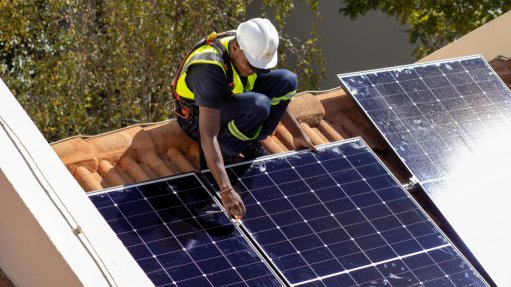RTS Africa Engineering – Growing interest locally and internationally in the multiple benefits of back-channel cooling and spin filter technology
This article has been supplied as a media statement and is not written by Creamer Media. It may be available only for a limited time on this website.
An electricity tariff increase of almost 10%, announced at the beginning of March 2016 has put further pressure on the industrial sector – and underscored the importance of energy efficiency in all aspects of company operations.
Variable speed drives (VSDs) have proven to be one of the most effective ways of reducing power consumption of motors, which reportedly account for about two-thirds of industrial electricity usage. Additional and significant reductions in consumption can be attained through ensuring that VSDs are installed with ‘back-channel cooling’: an innovative technological application which is being led in South Africa by RTS Africa Engineering.
Back-channel cooling offers a cost-effective way of ensuring that the temperatures within VSDs do not reach levels which risk shortening the life of these devices. The drives are often located in machine control centres (MCCs) or similar locations which provide appropriate protections, but may become very hot through the combined effects of ambient temperature and the heat generated by VSDs. Traditionally, site engineers have coped with this problem by installing large air conditioners that cooled the air in MCCs. With back-channel cooling, however, ambient air from outside the control centre is channelled through a VSD, over the heat sink of the device, then vented out from the MCC.
“The critical point here is that the channelled air does not have to be cooled. The steady flow of air over the heat sink keeps the VSD at ambient temperature, which is normally quite acceptable: the drive does not actually need to be kept at a cooler temperature,” explains Ian Fraser, Managing Director of RTS Africa Engineering.
“Up to 85% of the heat generated by VSDs is dispensed with through back-channel cooling, cutting down on the need for air conditioning. This translates into savings that can prove astonishing. Air conditioners are very energy-intensive, and they can be unreliable in harsh environments,” Fraser advises. Air flow is driven by a fan and passed through inertial spin filters, which address another key challenge of MCC environments: the build-up of dust. The spin modules used by RTS Africa Engineering remove 98% of particles measuring 15 micron (μm) or larger; while dust arrestance at 5μm is 80%.
As the modules make use of cyclone technology to capture dust (rather than filters which regularly become clogged) and are also self-purging, they require little maintenance. This provides further savings to the user, who also benefits from the fact that the modules – manufactured from high-density polypropylene – are exceptionally durable. In certain instances, spin filters installed by RTS Africa Engineering have been operational for more than 20 years. This more than repays the initial cost of investment in the filters, which may be higher than that of competing products.
The very simplicity and ingenuity of spin filter technology have sometimes proved an obstacle to its acceptance. “In the beginning, nobody believed it would work. However, word gets around, and our track record now speaks for itself,” Fraser adds.
RTS Africa Engineering has supplied spin filter technology to several key mines in South Africa and pan-Africa. The company is now seeing increasing interest in spin filters from other industrial sectors, and also from international enquiries. Currently, they are installing filters at a leading steel manufacturer where “dust-loading is a real challenge,” notes Fraser; while enquiries about the technology have come from Australia and India – markets that he believes hold great possibilities.
“I believe we have taken this technology much further than anybody else locally has,” says Fraser. “Clients come to us with complex filtration and ventilation challenges, and we work hard to find them a viable, sustainable and affordable solution. We purpose-build the technology, and it is not a standard product - it is all custom-designed. If it is possible to engineer it, we will do it,” Fraser concludes.
Comments
Announcements
What's On
Subscribe to improve your user experience...
Option 1 (equivalent of R125 a month):
Receive a weekly copy of Creamer Media's Engineering News & Mining Weekly magazine
(print copy for those in South Africa and e-magazine for those outside of South Africa)
Receive daily email newsletters
Access to full search results
Access archive of magazine back copies
Access to Projects in Progress
Access to ONE Research Report of your choice in PDF format
Option 2 (equivalent of R375 a month):
All benefits from Option 1
PLUS
Access to Creamer Media's Research Channel Africa for ALL Research Reports, in PDF format, on various industrial and mining sectors
including Electricity; Water; Energy Transition; Hydrogen; Roads, Rail and Ports; Coal; Gold; Platinum; Battery Metals; etc.
Already a subscriber?
Forgotten your password?
Receive weekly copy of Creamer Media's Engineering News & Mining Weekly magazine (print copy for those in South Africa and e-magazine for those outside of South Africa)
➕
Recieve daily email newsletters
➕
Access to full search results
➕
Access archive of magazine back copies
➕
Access to Projects in Progress
➕
Access to ONE Research Report of your choice in PDF format
RESEARCH CHANNEL AFRICA
R4500 (equivalent of R375 a month)
SUBSCRIBEAll benefits from Option 1
➕
Access to Creamer Media's Research Channel Africa for ALL Research Reports on various industrial and mining sectors, in PDF format, including on:
Electricity
➕
Water
➕
Energy Transition
➕
Hydrogen
➕
Roads, Rail and Ports
➕
Coal
➕
Gold
➕
Platinum
➕
Battery Metals
➕
etc.
Receive all benefits from Option 1 or Option 2 delivered to numerous people at your company
➕
Multiple User names and Passwords for simultaneous log-ins
➕
Intranet integration access to all in your organisation


















